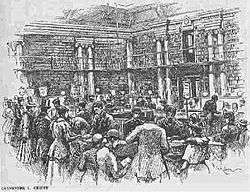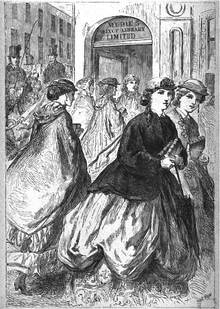Charles Edward Mudie
| Charles Edward Mudie | |
|---|---|
 Charles Edward Mudie by Frederick Waddy (1872) | |
| Born |
18 October 1818 Chelsea, London |
| Died | 28 October 1890 (aged 72) |
| Nationality | British |
| Occupation | Publisher, book seller, lending library proprietor |
Charles Edward Mudie (18 October 1818, in Chelsea – 28 October 1890), English publisher and founder of Mudie's Lending Library and Mudie's Subscription Library, was the son of a second-hand bookseller and newsagent. Mudie's efficient distribution system and vast supply of texts revolutionized the circulating library movement, while his "select" library influenced Victorian middle-class values and the structure of the three-volume novel. He was also the first publisher of James Russell Lowell's poems in England, and of Emerson's Man Thinking.
Early life
Charles Edward Mudie was born in 1818 to Scottish parents in Cheyne Walk, Chelsea. He received most of his education by assisting his father in his newspaper shop until he was twenty-two.[1] In 1840, Mudie opened his first shop on Upper King Street, Bloomsbury.[2]
Mudie's Lending Library
Mudie originally opened his circulating library to give the public greater access to nonfiction works—which took up nearly one third of his stock—but the market value of the novel brought Mudie financial success.[3] In 1842, he began to lend books to students at the University of London, charging subscribers one guinea per year for the right to borrow one volume of a novel at a time.
Expansion
This proved so successful that in 1852 he moved his "Select Library" to larger premises at 509, 510 & 511 New Oxford Street,[4] at its junction with Museum Street and Hart Street, just a few yards south of the British Museum.[5] Mudie's soon had outlets on Cross Street in Manchester and on New Street in Birmingham.

London book deliveries were carried out by vans, and the expansion of railroads and trains allowed people to order books across the country. International orders were also issued and shipped abroad in tin boxes.[6] Mudie's also exported books using watertight boxes, some of which were reported to have survived shipwreck.
Mudie was able to offer publishers advance purchase of three or four hundred copies of their new books and obtained corresponding discounts. The company's withdrawn books were offered for sale at £5 for a hundred volumes in 1860.[5]
Censoring Material
Since the cost of novels in the Victorian era was such that most middle-class English people could not afford to purchase novels privately, popular lending libraries like "Mudie's" had a strong influence over the public—and thus over authors and publishers. Mudie's demands that fiction novels be suited to the middle-class family controlled the morality, subject and scope of the novel for fifty years.[7] His "select" books were carefully chosen with these considerations in mind; once the Mudie Library considered a book unfit for its customers, other libraries followed suit. The rise of the three-volume novel can be directly attributed to this influence, and Mudie's refusal to stock "immoral" books and "novels of questionable character or inferior quality",[8] such as George Moore's A Modern Lover (1883), A Mummers Wife (1885) and A Drama in Muslin (1886), also had an effect on the direction of Victorian literature.
George Moore criticized the moral and structural power the circulating library system had on literary distribution. His response to censorship was to issue a number of polemics against circulating libraries, the most popular being Literature at Nurse, or Circulating Morals. He confronted Mudie on why the librarian refused to sell A Modern Lover. Mudie's response:
"Your book was considered immoral. Two ladies from the country wrote to me objecting to that scene where the girl sat to the artist as a model for Venus. After that I naturally refused to circulate your book, unIess any customer said he wanted particularly to read Mr. Moore's novel."[9]
Mudie was also crucial in the success of scientific volumes – In November 1859 he bought 500 copies of the first publication of Charles Darwin's On the Origin of Species.[10] In fact, much of Darwin's own reading was obtained from Mudie's nonfiction collection. His five-guinea annual subscription allowed him to borrow a parcel of up to six recently published books a month.[11]
In 1860, the company's New Oxford Street premises were substantially enlarged, and new branches of the business were subsequently established in other English cities such as York, Manchester and Birmingham.[nb 1] In 1864 Mudie's was converted into a limited company. [13] On August 18, 1871, directors of Mudie's Select Library (Limited) controlled the English and Foreign Library (formerly known as Hookham's).[14] Mudie's library continued into the 1930s.[15] The decline of Mudie's eventually came as a result of the rising number of government-funded public libraries, which offered similar services at a much reduced rate.
Notes
- ↑ Competitors of Mudie's in London in the 1870s included circulating libraries of Bolton, Day, Miles, Rolandi, W.H. Smith & Sons, and United.[12]
Sources

- Trafficking in Literary Authority: Mudie's Select Library And The Commodification Of The Victorian Novel, L Roberts – Victorian Literature and Culture, 2006 – Cambridge Univ Press
- A Victorian Leviathan: Mudie's Select Library, Guinevere L. Griest, Nineteenth-Century Fiction, Vol. 20, No. 2, 103–126. Sep. 1965
- Anonymous (1873). Cartoon portraits and biographical sketches of men of the day. Illustrated by Frederick Waddy. London: Tinsley Brothers. pp. 72–73. Retrieved 6 January 2011.
Cultural References
- Mudie's Library is mentioned in the H. G. Wells classic, The Invisible Man: "We crawled past Mudie's, and there a tall woman with five or six yellow-labelled books hailed my cab, and I sprang out just in time to escape her, shaving a railway van narrowly in my flight. I made off up the roadway to Bloomsbury Square, intending to strike north past the Museum and so get into the quiet district."
- Virginia Woolf refers to Mudie's Library several times in her 1922 novel Jacob's Room. From chapter 9: "Time is issued to spinster ladies of wealth in long white ribbons. These they wind round and round, round and round, assisted by five female servants, a butler, a fine Mexican parrot, regular meals, Mudie's library, and friends dropping in."
- The manga Emma, which takes place in Victorian England, features Mudie's Lending Library
· In "The Importance of Being Earnest" by Oscar Wilde, first produced in 1895, young Cecily Cardew, ward of a well-to-do gentleman living in Hertfordshire, speaking to her teacher Miss Prism about "memory" says that "it usually chronicles the things that have never happened, and couldn't possibly have happened. I believe that Memory is responsible for nearly all the three-volume novels that Mudie sends to us." Act II, Sc. 1.
In the first of Anthony Trollope's Palliser novels, 'Can You Forgive Her?', Alice newly arrived at Matching Priory, replies to Jeffrey Palliser:
'"I have amused myself by reading.” “Ah; they never do that here. I have heard that there is a library, but the clue to it has been lost, and nobody now knows the way. I don’t believe in libraries. Nobody ever goes into a library to read, any more than you would into a larder to eat. But there is this difference;—the food you consume does come out of the larders, but the books you read never come out of the libraries.” “Except Mudie’s,” said Alice. “Ah, yes; he is the great librarian.'
References
- ↑ Curwen, Henry (1873-01-01). A History of Booksellers, the Old and the New. Chatto and Windus, Publishers.
- ↑ London Circulating Libraries, London: The Times, 2 September 1913
- ↑ "Mudie's Select Library and the Form of Victorian Fiction". www.victorianweb.org. Retrieved 2015-12-02.
- ↑ "London". Hodson's Booksellers, Publishers and Stationers' Directory. London: W.H. Hodson. 1855.
- 1 2 Priestland, Neal (2 July 2008). "Bromley House Library 1816 to 1916 "M"". Retrieved 1 January 2011.
- ↑ Sutherland, John (2014-10-13). The Longman Companion to Victorian Fiction. Routledge. ISBN 978-1-317-86332-8.
- ↑ http://www.victorianweb.org/economics/mudie.html
- ↑ Spiegel, Nancy (2011 May). Circulating libraries: library history and architecture. Retrieved from: http://news.lib.uchicago.edu/blog/2011/05/05/circulating-libraries/ (Links to an external site.)
- ↑ Moore, George (10 December 1884). "The New Censorship of Literature". Pall Mall Gazette.
- ↑ Browne, E. Janet (2002), Charles Darwin: vol. 2 The Power of Place, London: Jonathan Cape, p. 89, ISBN 0-7126-6837-3
- ↑ Browne, Janet (2011-05-18). Charles Darwin: The Power of Place. Knopf Doubleday Publishing Group. ISBN 978-0-307-79368-3.
- ↑ "Circulating and Lending Libraries", Handbook to London as It Is, London: John Murray, 1879
- ↑ Chisholm 1911.
- ↑ Guinevere L. Griest (1965). "A Victorian Leviathan: Mudie's Select Library". Nineteenth-Century Fiction. 20. JSTOR 2932540.
- ↑ Hendrik Edelman (2001). "Circulating Libraries and Reading Rooms". In David H. Stam. International Dictionary of Library Histories. Chicago: Fitzroy Dearborn Publishers. p. 55. ISBN 1-57958-244-3.
- Attribution
![]() Chisholm, Hugh, ed. (1911). "Mudie, Charles Edward". Encyclopædia Britannica (11th ed.). Cambridge University Press.
Chisholm, Hugh, ed. (1911). "Mudie, Charles Edward". Encyclopædia Britannica (11th ed.). Cambridge University Press.
Further reading
- Catalogs
- Mudie's Select Library. (1860), Catalogue of new and standard works in circulation at Mudie's Select Library, London: Mudie, OCLC 12062366
- 1865
- Mudie's Select Library. (1907), Catalogue of Dano-Norwegian, Dutch, French, German, Italian, Polish, Russian, Swedish and Spanish works in circulation at Mudie's Select Library, London: Mudie's
- Mudie's Select Library. (1907), Catalogue of the principal English books in circulation at Mudie's Select Library, London: Mudie's
- 1911
- About Mudie's
- "Mudie's." Leisure Hour, 1861
- "Going to Mudie's." London Society v.16, no.95, Nov. 1869.
- Clarence Gohdes. British Interest in American Literature During the Latter Part of the Nineteenth Century as Reflected by Mudie's Select Library. American Literature, Vol. 13, No. 4 (Jan. 1942), pp. 356–362
- Guinevere L. Griest (1970), Mudie's circulating library and the Victorian novel, Bloomington: Indiana University Press, ISBN 0-253-15480-4, 0253154804
 Boase, George Clement (1894). "Mudie, Charles Edward". In Lee, Sidney. Dictionary of National Biography. 39. London: Smith, Elder & Co.
Boase, George Clement (1894). "Mudie, Charles Edward". In Lee, Sidney. Dictionary of National Biography. 39. London: Smith, Elder & Co.
External links
| Wikimedia Commons has media related to Mudie's Library. |
- Pratt Institute. Bookplate of Mudie's Select Library
- Flickr. Mudie's Library label in a 1928 collected edition of Sherlock Holmes stories, published by John Murray
- New York Public Library. Portrait of Mudie